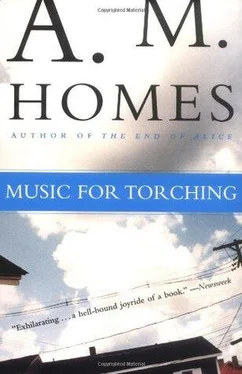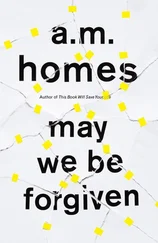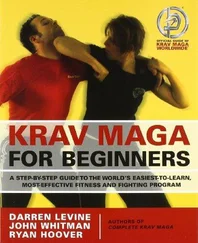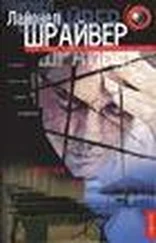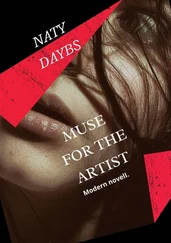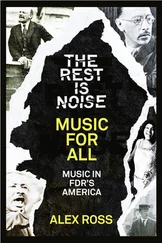Paul hurries off the train.
Monolithic skyscrapers push out of the ground, steely and
strong. Shafts of light cut between the buildings, punctuating the boulevard. Park Avenue is like a Grand Canal filled with shining black town cars-gondolas of good fortune. Every morning the streets are filled with Pauls-scrubbed and polished men in thousand-dollar suits thinking they are something. One hundred thousand offices, a million windowless cubicles, creativity and commerce. The metropolis hums-sings of the spirit, of the romance of trade, of the glory of the great game-things bought and sold. Paul is flooded with the anticipation of doing a good day's work.
He takes off his jacket, hangs it over his shoulder, using his finger as the hook, and strides up Park Avenue. He makes a right onto Fiftieth Street.
She is there, waiting outside the building. He doesn't notice until it is too late-he swerves, he goes out wide on the sidewalk. He walks past the entrance, pretending he doesn't see her. He walks around the block. On Friday, he dismissed her. He phoned her and told her it had to stop.
"Why are you calling me?" she said. "Are you afraid to see me?"
"No," he lied. "I'm calling to tell you that I can't see you, I can't talk to you, I can't do this anymore. It's too much."
"What makes you think you can just call me up and say something like that, that you can dictate the way things are going to be?"
"I'm not dictating."
"What about me? Don't I have a say in this?"
He didn't say anything.
"You don't boss me," she said. "I do what I want-that's who I am."
"This is not a negotiation," Paul said. "I have to go now." He hung up, drenched in sweat.
Paul comes around the corner again, sticking close to the edge of the building, hoping all she wants to do is scare him, hoping she'll be gone when he gets to the door.
She's still there. Waiting. She calls out, "Forgot where you work? Thought I'd just disappear?"
"It's Monday morning," he says, as though that gives him some immunity. "You're not supposed to be here," he clarifies.
"Free country," she says.
"Henry's very upset," Paul says. "You're not being nice to him. You should call him."
"He's not the one telling me to fuck off," she says loudly.
Paul tries to slip past her and into the revolving door. She blocks his way.
"Stop it," he says. "I have to go to work. You're harassing me."
"No," she shouts, snapping like a thing suddenly sprung. "You're harassing me." She speaks sharply enough that heads turn.
"Leave the girl alone," someone says.
Cold panic, Paul sees the way things can get turned around.
"I'm going to work," he hisses.
She presses into the revolving door ahead of him, turning to face him, talking through the glass. He goes around twice, hoping she'll finish quickly, hoping to lose her along the way.
"What makes you think you can dictate the way things are going to be?" she says, repeating her Friday line.
"I'm not dictating," he says, his breath fogging the glass. "I'm simply telling you that I can't see you anymore."
"You don't make the rules," she says.
"Leave me alone," he whispers as he slips out of the revolving door and into the marble lobby. "Go away."
She follows him. He ignores her. He makes himself steely. He gets into a crowded elevator. She crams in after him. This is exactly why it has to stop. She has no control, no reason, no logic. She rides up. Paul's tattoo is suddenly itching, burning as though it recognizes danger. He worries what she'll do when they get to his floor. Will she get off when he does? Will she follow him, biting at his heels? Will someone have to call security? Will he have to have her removed like a malignancy? Will she ruin everything?
At the forty-fourth floor the doors open. Paul gets off. She stays on.
"See you later," she says as the elevator doors close.
"Would you like a muffin?" his secretary asks.
Paul stares. He has no idea what she's talking about.
"A breakfast muffin? Corn, blueberry, bran?"
He shakes his head no.
"A doughnut then?"
"I had pancakes," he says, and goes into his office.
He needs a moment to gather himself. He calls Mrs. Apple. He dials and hangs up. He can't talk to her; he knows he will blurt-Why are you moving? He will accuse-Why am I the last to find out? He will defend-I'm just wondering about my time, trying to plan my days.
How can he ask without seeming to have formed an attachment, without seeming to cling, which is the one thing that isn't allowed? No expectations. No attachments.
Paul looks out his window. Across the street the windows are being washed, an urban ballet, men on a rig, descending-har- nesses, ropes, safety belts.
His secretary buzzes. "You've been summoned," she says. "Down the hall."
"Pardon?"
"Mr. Warburton has asked to see you."
Do they fire people on Monday mornings? He thinks of
the palm kisser's advice: begin again. He stands up, dips his hand into his pocket, and pulls out a fistful of pills. With no idea of which is for what, he takes three-yellow, red, blue-figuring he's covering all the bases, primary colors.
The big guy is behind his desk, jacket off, sleeves rolled up, his tie thrown over his shoulder. He's pushing paint around on a glossy white piece of fingerpaint paper. He raises his hands, flashing his palms at Paul. Dipped in red, the lines of his palms are thrown into relief-heart, health, long life. "The sensation is incredible," Warburton says, squirting paint through his fingers. "This is what work should be about, getting your hands dirty. I'm doing the quarterly report." Using his index finger, he cuts an arrow through the red. "Things are going up," he says.
"Looks good," Paul says.
"It's so much fun," Warburton says, grinning, and then he gets serious. He wipes his hands on a paper towel. "Have you given any thought to our discussion last week?"
Paul raises his eyebrows. He doesn't want to give anything away, doesn't want to assume, presume, or be disappointed. "Which discussion?"
"The empty office," Warburton says.
Paul nods. "I'm looking into desk chairs. I'm thinking a cushion might be just the thing."
Warburton gives him the nod. "Will a cushion be high enough?"
"I may need a pile."
"Whatever it takes," Warburton says, and then he's back to painting. "Whenever you're ready it's yours. And by the end of the week I'd like to have your thoughts on fat. How do you make people think fat is good?" He stops. He meets Paul eye to eye. "Have you heard the stories about fat substitutes and anal leakage? Are they true? I want you to investigate, personally."
Paul sits at his desk in an anxious stupor. He conjures the sensation of good work, productivity, and pride, the dream of the office. Images move through his mind, flashbacks, juxtapositions: the boy with the barbells in his brows, the date, the palm kiss- er-"Every minute is a new beginning." Paul looks at his watch; several new beginnings tick by. He takes out his paper and paints. He dips in.
A package arrives; his secretary buzzes. "B and B Office Supply. Shall I sign for it?"
Paul steps out of his office. "Don't sign anything. Don't open anything. Send it back. I didn't order anything." He thinks of ticking packages, Unabombers, mercenaries, girls gone mad, men at work with blown-off fingers, with stumps and stubs. "It's not worth the risk."
"You asked for it," the messenger says, trying to hand the package to Paul.
Paul refuses, he hides his hands behind his back. "I did not," Paul insists. As he's insisting, he remembers that he did order something last Friday, a portfolio for his watercolors. He remembers them saying they'd send it on Monday, but he can't say that now, he can't undo what's already being done; it's gone too far. He remains indignant. "This is a scam."
Читать дальше
